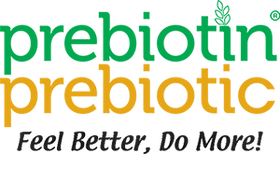
by Dr. Frank Jackson
Prebiotin Academy
Medical Concerns, Scientific Research and Diets
Colon Gas and Flatus
Resources on this page:
The Facts
Introduction
The colon is home to a myriad number of different bacteria. This dense, thriving mixture of over 1,000 different species is a true living health laboratory, producing many health benefits if it is treated and fed properly. Many of these bacteria within the colon are gas formers. This is normal and 99% of these colon gases are harmless and odorless.
What Are These Gases?
- Hydrogen – This is a major part of colon gas. It is made by bacteria and, indeed, is used by other bacteria in their own metabolism.
- Oxygen – This is the same gas as is in the air we breathe.
- Carbon dioxide – Most cells in living organisms make this gas, so it is not surprising that bacteria do so as well.
- Methane – About 40% of people make this odorless but explosive gas. It was always thought to be inactive but now some current research indicates that it might contribute to constipation.
- Trace gases – These are present in very tiny amounts, but since most are based on sulfur (like garlic), certain bacteria will create smelly sulfide gases, even when present in very small amounts.
What Is a Normal Amount of Colon Gas and Flatus?
The amount produced each day varies widely. Every person will have her or his own characteristic makeup of bacteria, which stays pretty much the same over long periods of time. So, the amount of colon gas will depend on the genetic makeup of the person. Furthermore, the amount of gas created will also depend on the types of foods eaten. So, the total daily amount can vary between a pint of gas to several quarts each day. The normal number of passages of gas or flatus ranges between 10 and 20 per day.
- Colon gas depends on a person’s genes and the foods eaten.
- 10-20 passages of gas per day is normal.
Sorbitol
This sugar is used as a non-caloric sweetener in some chewing gums and many diet foods. It acts exactly like lactose in the colon, producing excess colon gas and, in some, diarrhea.
Foods
- Beans and legumes – Most vegetables in this category contain certain types of carbohydrates that are not digested in the small bowel but, again, are fermented in the colon.
- Cruciferous vegetables – Brussels sprouts, cabbage, cauliflower, and broccoli are noted by some to cause excess gas. This is an interesting group as these vegetables also contain large amounts of an anti-cancerous substance called sulforaphane. You should eat as much of these vegetables as you can tolerate.
- Carbonated beverages – These contain carbon dioxide, most of which is belched back up or absorbed. Very little reaches the colon.
- Fiber – Fiber is a critically important part of the diet. Almost all plant food contains both insoluble (no gas) and soluble fiber (may form gas). We all know that increased fiber is a very important part of the diet. If we get too much of the soluble type, then the colon bacteria can manufacture excessive gas. A newly discovered form of fiber is prebiotics. These soluble plant fibers have been found to allow many health benefits to occur in the colon.
What To Do?
There is no one answer that is right for everyone. However, as a first step, you need to decide what is most important to you. As a physician, I would always recommend that vegetables, fruits, seeds, and nuts, are at the top of the list, as the fibers, antioxidants, and cancer preventing parts of these foods cannot be obtained elsewhere. For detailed recommendations, go to the Diet section on this page. In short, I would recommend:
- Increase fiber in the diet gradually.
- Beans and legumes are a wonderful source of protein and fiber, though if it contributes to colon gas, they should be used only
moderately. - Use milk and dairy products carefully if you are intolerant of lactose.
- Give up sorbitol in chewing gum and diet foods. From a health standpoint, it only sweetens. It does nothing more.
- Fiber supplements, especially prebiotic fiber supplements, should be added in only small amounts for the first week of use. Take perhaps half the recommended dose. Then gradually increase them to
tolerance.
So That’s It
You can’t change your genes. You can change what you eat and drink. By doing so in a careful, reasonably planned manner, colon gas can be controlled in just about everyone.
Diet
Colon Gas and Bloating – Diet Prevention
Introduction
Many of our patients want more information about living a happier and more confident lifestyle by eating a diet designed for gas prevention. Although even the healthiest of diets will produce some gases — making a gas-free diet nearly impossible — you can positively affect the quantity of the smelly gas certain processes sometimes produce. Here is what you need to know about flatus prevention, and how eating low gas foods and supplementing your diet with prebiotic plant fibers can help embarrassing sulfide production.
How the Body Produces Gas
The body breaks down everything we eat and drink to produce energy. The digestive process begins in the mouth and proceeds in the stomach, and later, the intestines. As the body breaks down these calories to make energy, gas is produced, which the body then releases through burping and flatulence. The average person releases gas about 20 times a day. Most times, passed gas is painless and odorless; however, on some occasions, gas can cause distension, bloating, painful cramps and smelly odors. When bad bacteria live in the colon, they produce more offensive odors, and sometimes, more gas.
The thriving healthy mix of bacteria within the colon does not happen without the production of some gases. Most of these gases are odorless – hydrogen, oxygen, carbon dioxide and methane. Nitrogen is also present from swallowed air, which then moves down into the colon. So, bacteria produce most of the gases that are passed as flatus. The tiny amount of the remaining gases are the sulfide ones. These are the smelly gases that are made by just a few species of bacteria specialized for this process. These rascals rely on sulfur in the water, food, beverages, and indeed, some medications we swallow to make these sulfide gases, including hydrogen sulfide.
Controlling Flatus With a Low Gas Diet
The good news is, you can affect the quantity and odor of the gas your body naturally produces by eating a diet comprised of insoluble plant fibers found in certain vegetables and supplements. A certain variety of plant fibers called prebiotics is especially effective at controlling the bacteria that create gases — smelly and otherwise. These prebiotic fibers, called inulin and oligofructose, are contained in several common foods. Although these foods include popular vegetables such as onions and garlic and grains such as whole wheat bread, the trick to controlling a low gas diet is consuming enough of these foods to positively affect the bacterial mix in the colon. Unfortunately, the majority of people don’t eat enough of these healthy-bacteria-producing foods to make this positive change. Some people who eat high levels of soluble fibers — found in foods such as beans — produce too much flatus. If you eat copious amounts of soluble fiber, cutting back on those foods while adding insoluble fiber-rich foods should be tried first.
Here is where prebiotic supplements can come in handy. Prebiotic fiber supplements have been proven to fertilize the healthy, non-sulfide-producing bacteria in the colon while stifling the proliferation of the bad. Although many people have difficulty eating enough prebiotic-rich foods, a prebiotic supplement can add these beneficial fibers in a low-calorie, low-cost way.
What Is Normal?
Believe it or not, there is really a limited amount of information in the medical literature on this socially important question. Everyone will have her or his own idea of what normal is. Here is some general information that medical texts provide.
- The amount of colon gas produced per day ranges from one pint to several quarts.
- The number of flatus passages per day may be as low as 7 in females and up to 20 or more in males. An average is probably 10-13 flatus passages per day.
- Men create more colon gas than females.
- So do smokers. Don’t ask why. We don’t know.
- Beer drinkers have smellier flatus, probably because most beer contains significant amounts of sulfur.
Plant Fiber
There are two main types of fiber, insoluble and soluble, and almost every plant will have some of each. Insoluble fiber does not dissolve in water, is not acted on by colon bacteria and so does not create colon gas. It is an important fiber, however, in that it hangs on to water within the colon, promoting a larger, bulkier stool and improved regularity. The second type of fiber is soluble, meaning it does
dissolve in water and is fermented by colon bacteria. Some of these bacteria, then, create colon gas.
Most plants have both fibers to varying degrees. As examples, the fiber in wheat is mostly insoluble while those in oats and beans are mostly soluble. A special type of recently discovered prebiotic soluble fibers are inulin and oligofructose. These fibers have had a great deal of research done on them lately and multiple, very significant health benefits have been found to occur with them. Still, they are soluble and, as such, do produce colon gas just like all soluble fibers will if too much is taken.
The key is to get a good balance of these fibers. The recommended total fiber intake per day is 25-35 grams, depending on your sex, age, and weight. At this level, multiple health benefits occur. However, if excess colon gas and flatus is the problem, then cutting back on soluble fiber should be done first.
Flatus Odor and Sulfate
Sulfate is the culprit. It is also a very necessary element in the diet as our body needs it for many functions. The problem with noxious flatus odor is that certain bacteria in the colon make sulfide gases in very tiny amounts, but certainly enough to be noticeable. It is pretty simple. The more sulfate you ingest, the more of it is available for colon bacteria to make sulfide gases. So where is the sulfate we ingest?
- Drinking water – up to 20% or more may come from drinking water, depending on where yours comes from. City water is monitored so there won’t be too much, but well water can vary significantly.
- Beverages – beer, red and white wine, cider, apple, grape and tomato juice, and even cow’s milk have significant amounts of sulfate.
-
Foods – the following have moderate amounts of sulfate:
- Almonds
- Breads
- Cruciferous vegetables - broccoli, cauliflower, brussel sprouts, cabbage
- Dates
- Dried apples, apricots - dried fruits are very high in sulfate
- Wheat Pasta
- Peanuts
- Prunes
- Raisins
- Animal Protein – There are only two amino acids, methionine, and cystine, that contain sulfate but these are present in all animal products. The more meat, fish, and poultry you eat, the more sulfate enters your colon.
- Supplements – chondroitin sulfate, glucosamine sulfate and MSM (methylsulfonylmethane) are used by many people for bone and joint disorders. These have significant amounts of sulfate. So does carrageenan, used as a thickening agent in many prepared foods. Read the labels.
So the first step to controlling flatus smell is to moderate the amount of sulfate containing foods and supplements you take. The second step is to acidify your colon.
Colon Acidity and Prebiotics
A little-known fact, even to those in the medical field, is that the sulfide-producing bacteria in the colon can’t grow in an acid environment. So, the trick is to acidify the colon by providing certain plant fibers that other good bacteria use to make acidic substances called short chain fatty acids. These fatty acids are a food source for the colon’s own cells. The plant fibers that do this best are the prebiotics. These can and should be obtained in certain foods as listed in prebiotics. These can also be obtained in prebiotic supplements. My own research on family and friends shows that while prebiotic fiber supplements may not change the amount of colon gas, it will reduce and even eliminate the malodorous flatus smell. You should use enough prebiotic fiber supplement to reduce or stop the smell but not so much as to get too gassy.
So, to reduce noxious flatus smell:
- Reduce sulfates in beverages, food, dietary supplements and pills
- Take prebiotic supplement to acidify the colon.
Final Flatus Factoids
The following are common sense tips on flatus. They may not work for everyone but perhaps a few might.
- If you have no or little flatus, then you likely are not getting an adequate amount of soluble prebiotic fiber in your diet. The good benefits of these fibers can’t be obtained without a minimal amount of
gas production. - Chewing gum – When you chew gum, you swallow more often and some air goes down into your stomach with each swallow. What you don’t belch up goes into the colon, where it can contribute to flatus.
- Beans contain special types of carbohydrates that some colon gas forming bacteria love. These carbs are not part of the prebiotic family that are so good for the colon and for general health. However, beans are a great source of protein and other fiber, so it can be a dilemma for some people. Soaking and/or overcooking beans may help reduce gas formation. Do the experiment and see.
- Beano is an over-the-counter product touted for helping reduce flatus. It is an enzyme that works only on the carbohydrate in beans and only if it mixes with the chewed up beans in the stomach. So, you need to take the pills, and usually a lot of them, while you are eating beans. You can try taking the pills after eating but the results may not be as good.
- Gulping food or eating fast may result in more air being swallowed, which results in more of this air in the colon. So, slow down and chew your food well.
- Over-the-counter remedies – Gas-X and other similar preparations are simethicone, which is a chemical that breaks down small intestinal bubbles into big ones. I am not sure of the benefit as it does not get rid of gas. Charcoal tablets are reputed to absorb the bad sulfide smell. It has never been proven very well. Reducing sulfur in food and acidifying the colon with prebiotic foods and supplements makes more sense.
- Odor-eating underwear – Yes, you can get these online. They seem a bit of a stretch and inconvenient for a physiologic event that can be controlled in other, more natural ways.
Summary
The amount of colon gas and flatus can be controlled by modifying the amount of soluble fiber in the diet. You should not eliminate soluble fiber entirely because it provides so many health benefits to the colon and
body.
The smell of flatus can be controlled by reducing the amount of sulfur containing foods and beverages and by making the colon more acidic using a prebiotic soluble fiber.
So, it is a balance. My recommendation is to use enough soluble fiber so that your colon gas and flatus is tolerable to you. When the noxious smell of flatus is gone, then that is the right dose.
Explore More
Medical Concerns, Scientific Research and Diets
-
Antibiotics and the Microbiome
-
C. Difficile
-
Calcium and Bone Density
-
Cancer
-
Celiac Disease and Gluten Intolerance
-
Children and Prebiotics
-
Colon Gas and Flatus
-
Colon Polyps and Cancer
-
Constipation
-
Crohn’s Disease
-
Diabetes Type 2
-
Diarrhea
-
Diverticulosis
-
Dysbiosis
-
End Stage Kidney Disease/Dialysis
-
Fatty Liver/Steatohepatitis
-
Fissure, Fistula and Abscess
-
Gut-Brain Connection
-
Heart and Cardiovascular
-
Hemorrhoids
-
High Fiber Diet
-
Immunity
-
Inflammatory Bowel Disease
-
Irritable Bowel Syndrome
-
Leaky Gut Syndrome
-
Low Fat Diet
-
Low Fiber Diet
-
Obesity and Weight Management
-
Toxins in the Colon
-
Ulcerative Colitis





